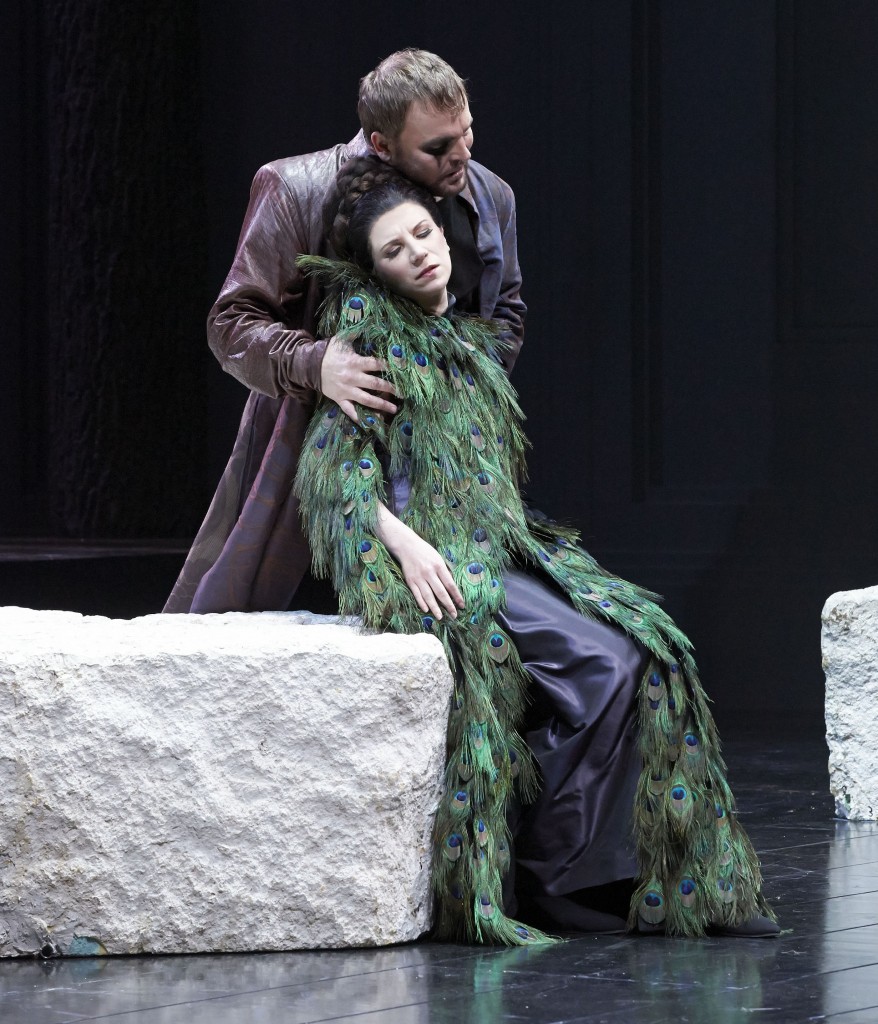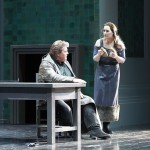 It began to go wrong with the announcement that Peter Seiffert (Siegmund) had laryngitis but would, nevertheless sing. (Warm applause from the audience). Jeffrey Tate, engaged to conduct the entire Wagner Ring cycle had already cancelled due to illness: replaced tonight by Cornelius Meister. The solid cast still included Nina Stemme (Brünhilde ) and Tomasz Konieczny’s Wotan. At least the foundations of Vienna State Opera’s production for Die Walküre were dependable: Rolf Glittenberg’s stage design, both minimalist and monumental, the costumes unobtrusive, classic, modern, with a gothic twist.
It began to go wrong with the announcement that Peter Seiffert (Siegmund) had laryngitis but would, nevertheless sing. (Warm applause from the audience). Jeffrey Tate, engaged to conduct the entire Wagner Ring cycle had already cancelled due to illness: replaced tonight by Cornelius Meister. The solid cast still included Nina Stemme (Brünhilde ) and Tomasz Konieczny’s Wotan. At least the foundations of Vienna State Opera’s production for Die Walküre were dependable: Rolf Glittenberg’s stage design, both minimalist and monumental, the costumes unobtrusive, classic, modern, with a gothic twist.
In the dramatic opening, urgent strings, blazing horns, flashes of lightning reveal a sparsely furnished stage. The white silhouette of a wolf (the Wälsung emblem) is projected side of the stage enclosing the Hunding’s humble living room, the refuge for the desperate Siegmund. (Hunding’s wife Sieglinde takes him in-unaware of his identity, Siegmund being her brother.) Gun-Brit Barkman’s soprano is clear, with a classical purity. She’s a slightly-built figure-dark-haired, tenderly eyeing him as she brings him food. She revives him: Die Sonne lacht mir neu, proclaims Siegmund. But he sings (Seiffert movingly) of how misfortune follows him: Mitsunde folgt mir. Woeful (Wehmut) he calls himself. They approach each other in a corner: the sound of a hunting horn disturbs them.
You are reviving him! Ain Anger an immensely deep bass, an experienced Hunding, has sung the role since 2007. They’re bound by the laws of hospitality. How he resembles my wife, comments Hunding. (Not exactly, Seiffert an immense figure in animal skins.) My father was a Wälsung, sings Siegmund, he lost both brother and sister. Ever an outcast, he’s plagued by bad luck; ruins everything. He’s wund and waffenlos (addressing Sieglinde). Seiffert, a tragic figure, has pathos and dignity. Hunding realises who’s the man before him: his call is revenge. But he’ll shelter him for the night, bear arms in the morning. 
The wolf is again projected moving across the back of the stage. Siegmund knows about the sword: Walse! Where is your sword. Seiffert, struggling, does his best. In a sublime aria, sings of the sun’s holy light that has inspired in him a new energy. Sieglinde, who’s given Hunding a sleeping potion, sings of the Held , the hero before her: of her tears and consolation. Barkmin has fine articulation, but does she have the power for this monumental role? Seiffert’s magnificent tenor is straining , but even his limited range rises above her. He sings of the Mondlicht (moon light). Du bist der Lenz ; Sieglinde’s top notes lack that rocket fuel. He saw her in a dream. She saw herself with a brother. Was Walse your father, she sings. ‘Siegmund so nenne ich dich’ – ‘Siegmund heisse ich und bin ich!’ He uses his name only in extremity. Noting, so he names the sword she unsheaths. They realise their relationship is adulterous, yet they will make eternal the Walsing dynasty.
Act 2 Die Walküre and we’re back to the ice floats of Valhalla. The stage is a subtle mix of sci-fi and gothic; there are pillars of craggy stalactites, the stage is bathed in a white moonlight. Curiously, the gods play with the heads of the protagonists, miniaturized like voodoo objects.
The daring husband is sick, (Der Kühn der Gatten verkrankt). Tomasz Konieczny’s baritone is sensational- deeper and more complex than in Das Rheingold– like a vintage wine. He’s a generation older since the bucaneering Wotan- the eye-patched figure in Rheingold. The transition is tremendous. Fricka (Elisabeth Kulman) : So it’s Schluss with the eternal gods? Untreu, fruchtlose. This Fricka is so slim, yet she has terrific vocal resources. She too seems more impressive than in Rheingold.
Her intervention must be powerfully convincing to persuade Wotan not to side with his son Siegmund. (Sieglinde is his daughter.) Surely the lord of all pledges cannot tolerate such unlawful adultery and incest? The Wälsung loses her honour: stick to your oath.
So Wotan, against his wishes -his hope was that a hero will win back the Ring- has to order Brünnhilde to kill Siegmund. I am the saddest of them all, sings Wotan. He recalls to Brünnhilde the tale of woe: Alberich’s curse. ‘Was ich liebe müss ich verlassen’, the curse of the gods. ‘Go to him’. The law must be implemented.
In Brünnhilde’s aria, Stemme sings Heavy weighs the weapon of rage: must he betray the faithful: (Leid müss dich treulos die treu veraten.) She is commissioned to kill Siegmund, but cannot: sides with both sinners; and demonstrating human weakness, loses her god-like status. Stemme is both goddess -superhuman vocal resources, immensely powerful range – and human, with warmth and poignancy.
In the Siegmund and Brünnhilde scene, Herbert Lippert has taken over from the heroic, but ill, Peter Seiffert. Lippert is not a helden tenor, but he sings lyrically.Brünnhilde forewarns him of his impending death, but promises a glorious entry into Valhalla . Siegmund rejects the offer when he learns Sieglinde cannot follow him there. (Brünnhilde protects Sieglinde pregnant with Siegfried.)
Act 3, and the set is astounding. We see life-size models of horses on stage, the body of Siegmund laid out. The warriors’ strife disturbs even the horses! the Rhinemaidens sing. The Ride of the Valkyries blazes from the orchestral pit. Brünnhilde sings that for the first time she’s being pursued- a thunderstorm from the north, representing her father’s rage.
In her confrontation with Wotan, Valkyrie, Walsa maid is she no longer. Is he casting her out? He pronounces, she’s no longer his emmissary. She’s condemned, exiled from the land of the immortals ‘aus der ewige Stamme.’ Wotan’s utters his curse: he who overpowers her will rule her maidenhood. Here the Rhinemaidens scream- Save her this disgrace – emitting a shrill, siren-like, wailing. She’ll never ride on horseback with the Valkyries again! Centre- stage Konieczny’s Wotan stands fiercely, swinging his spear in a circle like an Olympic javelin player.
![02_Siegfried_51376_STEMME[1]](https://viennaoperareview.com/wp-content/uploads/2014/09/02_Siegfried_51376_STEMME11-e1411041306417-150x150.jpg) Stemme’s appeal to Wotan is inevitably a highlight. ‘War es so schmach, war es so niedrig…‘: was her act so vile to suffer from a humiliation so dishonourable. Oh, look me in he eyes! Calm your rage. And she sings referring cryptically to ‘the hidden guilt that makes you abandon your favourite child.’ Did he not order her to fight for the Wälsung. But he became his own enemy when he acted on Fricka’s demand. She knows he loved the Walsing. And she had to help Siegmund; realised the hero’s distress. Machtige Trost : it was victory or death for Siegmund.
Stemme’s appeal to Wotan is inevitably a highlight. ‘War es so schmach, war es so niedrig…‘: was her act so vile to suffer from a humiliation so dishonourable. Oh, look me in he eyes! Calm your rage. And she sings referring cryptically to ‘the hidden guilt that makes you abandon your favourite child.’ Did he not order her to fight for the Wälsung. But he became his own enemy when he acted on Fricka’s demand. She knows he loved the Walsing. And she had to help Siegmund; realised the hero’s distress. Machtige Trost : it was victory or death for Siegmund.
She pleads- Stemme affecting, with human warmth- protect her as she sleeps: so only a hero will wake her. In this long scene, Wotan finally relents, changing his order to ‘the bravest man she encounters’; and surrounds her with a wall of fire impenetrable but to the bravest.
So the god departs, kissing the divinity from Brünnhilde. Somehow he lacked the cosmic dimmension. Konieczny is a lyrical, romantic bass-baritone (at his best, perhaps, in those Strauss roles (Mandrycka in Arabella.) Konieczny’s bass-baritone is, for me, not best suited for Wotan. Technically fine, but not superhuman. In other words, less interesting over (Wagner’s) long passages (unlike the Finn Juha Uusitalo in the 2009 performances of this Sven -Eric Bechtolf production.)
But super stage effects closing Act 3! Flames are projected around the stage – the horses still in place- to depict Brünnhilde’s fate. Terrifically effective. The flames even change direction, blowing, laterally, like Saturn’s rings.
Tonight’s conductor Cornelius Meister was competent, but lacked that spiritual quality the best Wagner conductors can summon- (Welser-Möst (2009), Christian Thielemann (2011) had it.) Over a five hour saga there has to be a structure, a game plan- not just enervating, shorter passages. Earlier, rather sadly, Peter Seiffert braved the first Act: valiant, but painful for him, risking that golden tenor. In-house tenor Herbert Lippert stepped in very plausibly: a lyric rather than Heldentenor, he looked right, and saved the evening. P.R. 22.06.2014
Photos: Thomasz Konieczny (Wotan) and Elisabeth Kulman (Fricka); Peter Seiffert (Siegmund) and Gun-Brit Barkmin (Sieglinde); Nina Stemme as Brünnhilde (photo from Siegfried) ; Featured image Peter Seiffert and Grun-Brit Barkmin
(c) Wiener Staatsoper/ Michael Pöhn
viennaoperareview.com
Vienna's English opera blog
